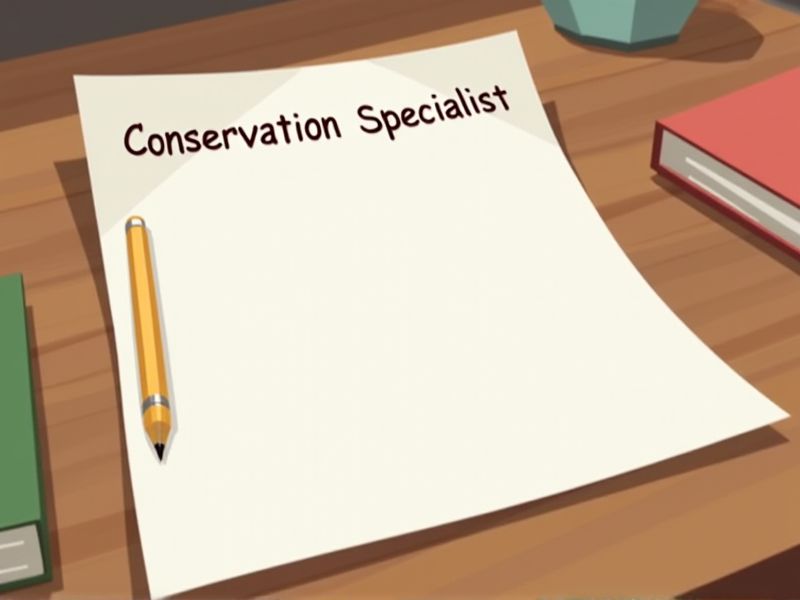
Conservation Specialists play a crucial role in preserving ecosystems by applying scientific knowledge and management techniques. Certifications ensure these professionals have validated expertise in biodiversity, ecology, and resource management, which are instrumental for effective conservation strategies. These credentials often provide advanced skills necessary for assessing environmental impacts, restoring habitats, and promoting sustainable practices. Here are some important certifications that can enhance your qualifications as a Conservation Specialist.
Certified Wildlife Biologist (CWB)
Certified Wildlife Biologists possess specialized knowledge in wildlife ecology, crucial for informed decision-making in conservation efforts. Their expertise in habitat assessment allows for better management of land to support biodiversity. The certification ensures they are up to date on the latest conservation techniques and regulatory compliance. Conservation specialists rely on their ability to design and implement effective conservation strategies, grounded in science-backed methodology.
Certified Ecologist (CE)
Conservation Specialists benefit from Certified Ecologists (CEs) as they provide rigorous expertise in evaluating and managing biodiversity and ecosystems. The presence of a CE ensures the application of scientifically backed methods to restore and preserve natural habitats. Their certification demonstrates a deep understanding of ecological principles, reducing the risk of ineffective conservation efforts. CEs also facilitate compliance with environmental regulations, helping avoid legal and financial repercussions.
Certified Environmental Professional (CEP)
Certified Environmental Professionals (CEP) bring a standardized level of expertise to conservation projects, ensuring best practices are followed. Hiring CEPs often results in more efficient project outcomes due to their deep understanding of environmental regulations and compliance requirements. Their specialized knowledge helps in identifying and mitigating potential environmental impacts early in the planning phase. Organizations with CEPs are better positioned to secure funding and partnerships, as they demonstrate a commitment to maintaining high environmental stewardship standards.
GIS Professional (GISP)
Acquiring the GIS Professional (GISP) certification enhances a conservation specialist's ability to analyze spatial data accurately, which is crucial for mapping and monitoring ecosystems. With advanced GIS skills, specialists can effectively identify patterns and trends in environmental changes, aiding in better decision-making for conservation strategies. Being recognized as a GISP instills trust and credibility, enhancing collaborations with stakeholders and partners in conservation projects. Knowledge in GIS allows conservation specialists to optimize resource allocation by pinpointing areas of critical ecological concern, ultimately contributing to more efficient conservation efforts.
LEED Green Associate
Having LEED Green Associate certification equips conservation specialists with a comprehensive understanding of green building principles, which aids in promoting sustainable development practices. It provides the technical knowledge essential to evaluate and implement energy-efficient and environmentally friendly solutions, aligned with conservation goals. The certification also enhances credibility when advising on projects related to habitat protection and resource management. Possessing this credential often results in improved collaboration with other sustainability-focused professionals, fostering integrated strategies for environmental conservation.
Registered Environmental Manager (REM)
Conservation specialists often tackle complex environmental challenges that require a comprehensive understanding of ecological systems, which a Registered Environmental Manager (REM) provides through rigorous training and certification. The REM credential assures stakeholders of the specialist's proficiency in regulatory compliance, risk assessment, and sustainable practices, enhancing project credibility. Conservation projects frequently involve multiple stakeholders, and an REM helps facilitate better communication and project management due to their broad expertise. The increased regulatory scrutiny in conservation efforts necessitates professionals like REMs who can seamlessly navigate legal requirements and implement effective environmental strategies.
Project Management Professional (PMP)
Earning a PMP certification equips a Conservation Specialist with structured project management skills, aligning conservation initiatives with defined timeframes and budgets. This certification enhances communication and coordination among team members and stakeholders, critical for the multifaceted nature of conservation projects. It provides a standardized framework to manage resources effectively, ensuring that conservation goals are met efficiently. Given the often limited funding and the complex logistics of conservation efforts, a PMP certification aids in optimizing these constraints for successful project completion.
Certified Sustainability Professional (CSP)
The Certified Sustainability Professional (CSP) credential equips conservation specialists with the expertise needed to implement and manage sustainable practices effectively. This certification ensures that they have the knowledge to balance ecological needs with economic and social considerations, enhancing conservation efforts. With CSP credentials, conservation specialists are better prepared to identify and mitigate environmental impacts in their projects. As industries increasingly prioritize sustainable approaches, having a CSP can enhance credibility and lead to increased opportunities for meaningful conservation work.
Certified Conservation Planner (CCP)
Certified Conservation Planners (CCP) bring a structured approach to conservation projects, ensuring plans meet regulatory standards and environmental needs. Obtaining the CCP certification demonstrates a specialist's commitment to up-to-date practices and principles in conservation. The certification process enhances a specialist's skills in assessing land resources and developing effective management strategies. CCPs facilitate trust and credibility with stakeholders, leading to more successful project implementations.
Certified Environmental Scientist (CES)
Certified Environmental Scientists (CES) possess expertise that helps in accurately assessing environmental impacts, which aids Conservation Specialists in developing effective preservation strategies. Their knowledge in environmental regulations ensures that conservation plans comply with legal standards, thereby avoiding potential legal issues. CES's data analysis skills enhance the ability to monitor ecosystems and evaluate the success of conservation efforts. Their scientific insights contribute to informed decision-making, improving the effectiveness of initiatives aimed at protecting endangered habitats and species.
Summary
When you earn certifications as a Conservation Specialist, your expertise is officially validated, making you more credible in the field. This recognition can lead you to better job opportunities and increased trust from stakeholders. Employers might be more inclined to consult with you on ecological projects due to your proven qualifications. Certification can also provide you with updated methodologies, enhancing the impact of your conservation initiatives.
